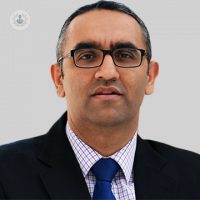UroLift – a new, simple way of treating an enlarged prostate
Written by:UroLift is a new minimally-invasive technique for treating an enlarged prostate, otherwise known as benign prostatic hyperplasia (BPH), by lifting the enlarged prostate tissue away from the urethra, so it doesn’t block it any more. Consultant urological surgeon Mr Rajesh Kavia is one of the few surgeons in the UK able to provide this treatment.

Benign prostatic hyperplasia (BPH) symptoms
The prostate is a gland located next to the bladder and surrounds the urethra. With Benign Prostatic Hyperplasia, the prostate becomes enlarged and can restrict the urethra, making it difficult to start to pass urine, and also to completely empty the bladder. The enlarged prostate can also press on the bladder causing a frequent desire to pee.
BPH is a common condition in men over 50, however, it is not believed to be linked to prostate cancer, with men who have BPH being at no greater risk of prostate cancer than those without. The cause is not known, but is believed to be related to changes in the hormonal balance as men age.
UroLift: a treatment for BPH
UroLift is a simple procedure performed by a consultant urologist where small implants are put in place in the urethra that holds the two halves of the enlarged prostate open. The procedure is as follows:
- A UroLift Delivery Device, a small device used to insert implants into the prostate, is inserted into the urethra, via the penis. The correct positioning is located via the use of an endoscope in the UroLift Delivery Device.
- Permanent implants are inserted into the prostate gland through a small needle. These implants hold the two lobes of the prostate gland open around the urethra, allowing the patient to pass urine more easily.
- The UroLift introducer is removed, and the implants permanently left in place.
The benefits of the UroLift system
UroLift is a minimally invasive procedure, meaning that the recovery time is much faster for the patient. The procedure is simple, meaning there are very few possible complications. The BPH symptoms are relieved very quickly, with patients experiencing few or no symptoms from two weeks after the procedure.
The patient’s sexual function is also maintained, and no medication is needed after the procedure. Compared to the more invasive procedures, where patients have the risk of incontinence, erectile dysfunction and retrograde ejaculation, the UroLift system has many benefits.
If you are interested in learning more about the UroLift procedure, book an appointment with Mr Rajesh Kavia at his clinics in West or Central London.


